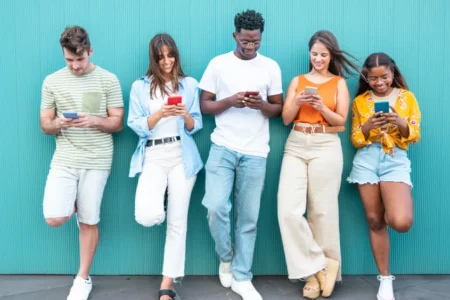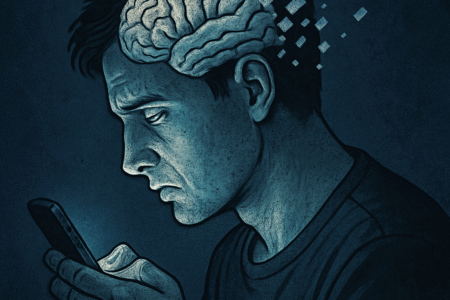While the problems caused by social media on human relationships are real and concerning, it is equally important to understand that we are not powerless. Social media is a tool, and like any tool, its impact depends on how we use it. When used with intent, it can provide value to our relationships rather than detract. In the second part of the article, we will introduce useful solutions, researched practices, and mindful habits to establish as we reconnect those human interactions in the digital space. 1. Make “Tech-Free” Places/Times and Limit Use One way to easily get back in-person interactions is by simply unplugging, which, by the way, also may involve managing screen time, especially at important moments. We have already talked about limiting app use, and enforcing daily limits has become very easy to do, as many apps can be monitored through phone settings, and other apps such as Moment or Digital Wellbeing. Select physical spaces (e.g., dining table or bedroom) or periods (e.g., 8 PM-10 PM) as tech-free zones. These rules encourage people to take some uninterrupted time with family, friends, or partners. A 2022 Harvard study reported that couples who adhered to “no phone during meals” guidelines rated satisfaction with their relationship 34% higher than those who did not. People could take some time to find ways to actively connect with people rather than passively scrolling. People can take their interaction to a more meaningful level: instead of just ‘liking’ a friend’s photo, ask them how they are doing. Use voice notes, set up video calls, and try to meet face to face. Social media can be used more deeply when it is not being used as a substitute for conversation but as a medium for real conversation. Psychologist Dr. Sherry Turkle, in her book Reclaiming Conversation, emphasizes: “Connection without conversation is merely distraction. Our aim is not more communication, but deeper communication.” For couples online, communication and trust are key components to using social media. Having some direct conversations about what each partner is allowed to do on their accounts, who they follow, how they follow, and what it means to them to be private can help avoid misunderstandings. Even though it can be easy to get caught up in over-monitoring your significant other, which often comes from fear, it is important to foster trust and mutual respect and enjoy the emotional bond you both share in a real way as a couple. There are a few apps meant to store memories with your partner in a private manner and deepen intimacy while not broadcasting every photo to the universe. Make a priority to meet people in person as often as possible. Coffee with a friend? A picnic weekend with family? A date night without phones? There is a richness of communication that happens face-to-face that you won’t find with an emoji or reel. Same for hybrid lifestyles (online + offline), but with a heavy emphasis on the real world. According to the American Sociological Review, 2024People who spend time regularly interacting in person reported 55% higher emotional well-being than those who primarily connected to others online. Unfollow any account that gives you feelings of insecurity or envy. Curate your feed for pages that spark inspiration, education, or joy. Follow a lot of mental health activists, real-life storytellers, and creators who include the behind-the-scenes and not just the jolt of the highlights. Instagram now has “quiet mode” and “hide like count” as features that lessen the pressure to consume. One practice of digital decluttering 6. Practice Digital Empathy and Respect When interacting online, remember that there are real people behind the screens. Avoid trolling, judgmental comments, or aggressive debates. Instead, be kind, understanding, and respectful—even in disagreement. In romantic or family contexts, never use social media as a tool to shame, ignore, or threaten someone. Promoting empathy online sets a standard for the kind of communication we want to reflect offline. 7. Educate Young Users About Healthy Social Media Habits Teens and children are the most vulnerable to the effects of social media. Parents and educators must engage with them regularly, not just by setting restrictions, but by encouraging digital literacy, critical thinking, and emotional awareness. Encourage open dialogue rather than punishment-based control. Programs like Common Sense Media offer toolkits for parents and schools to build a healthy relationship between youth and technology. 8. Therapy and Digital Detoxes for Long-Term Impact For individuals who feel overwhelmed, anxious, or lonely despite heavy social media use, therapy can be a powerful step. Therapists can help address deeper issues like validation-seeking behavior, addiction, or relationship fears. Additionally, occasional digital detoxes—even for a weekend—can reset mental clarity and improve focus on real-world connections. In 2022, a University of Bath study found that even a 7-day social media break led to significant reductions in anxiety and depression symptoms. Connection Over Consumption The ultimate goal is not to abandon social media, but to regain control over how it influences our lives and relationships. When used mindfully, these platforms can support communication, celebrate milestones, and maintain distant relationships. But when left unchecked, they can quietly dismantle the very bonds we value. By practicing self-awareness, setting clear boundaries, and nurturing empathy, we can reverse the damage and embrace a digital life that enhances—not replaces—our human connections. The future of relationships in the digital age lies not in isolation, but in intention. KEEP READING FORAMZ FOR MORE UPDATES
Social media is a mirror in today’s digital world, but it is a mirror that never accurately represents our true reflections; it always represents a filtered, edited, and curated version of life. For Generation Z (1995 – 2010), however, this mirror is nearly impossible to avoid. Social media is a part of everyday life, from taking Instagram selfies and TikTok dances to Snapchat streaks and aesthetic boards on Pinterest. But in the middle of all of the likes, followers, and hashtags is the growing concern of the pressure to be perfect, and how that pressure negatively influences self-esteem. For many Gen Zers, social media is more than just a form of screen time; it’s a lifestyle. Research tells us that teens and young adults average three to six hours a day scrolling their platforms of choice. Entertainment, connection, and creativity are just a few of the beneficial aspects of social media, but they also include an intense sense of comparison. The cycle starts innocently: you post a photo, wait patiently for likes to come in, and get flooded with that feel-good rush as the hearts come rolling in. In no time, you start to wonder why there are so many others with clearer skin, better fashion sense, or more interesting lives, or bigger circles of other fun people. It’s crazy! Logically, we know that all of those images are filtered, curated, posed, or crafted, but we can’t help the compulsion to compare. These constant comparisons lead to feeling inadequate: “Why isn’t my life as cool?” or “Why don’t I look like that?”. Little by little, these thoughts strip away at our self-esteem, especially when we are still figuring out who we are. Social media’s greatest detractor is that it depicts little of reality. Social media’s dark secret is that the people we follow typically only post their best experiences, the amazing vacations, the perfect selfies, and the beloved celebrations. As a result, we are left with this social media highlight reel that glosses over the messy, mediocre, boring, and mundane. Consequently, scrolling through hundreds of highlight reels each day can lead to the perception that everyone else is doing better than us. This can also contribute to feelings of anxiety, depression, and a skewed sense of self-worth. Gen Z is accustomed to this kind of pressure because social media has been prevalent in their lives since they were toddlers. A survey conducted by the American Psychological Association revealed that Gen Z participants experience the highest levels of stress compared to previous generations, with social media contributing much to the angst. A lot of teens feel they have to perform look perfect, act cool, be on-trend just to stay META! Technology has made changing your appearance only with a few taps to the screen, easier than ever filters can slim down your face, whiten your eyes, and smooth out your skin. Editing apps can transform your photos within seconds to help you look like a model. Some people just enjoy playing around with these tools, while others feel compelled to utilize them just to feel “good enough” to share a post. This creates a toxic cycle of insecurity. You might share an edited photo, receive some compliments, and briefly feel good. However, when you look in the mirror, you feel disappointed, not meeting the transformative “you” that you created online. What can be done? To begin with, it’s worth remembering that social media is not reality. Behind each perfect post is someone with just as many struggles, insecurities, and bad days as you have. Unfollowing accounts that make you feel awful about yourself, stepping away from social media, or setting screen-time limits are all great ways to help protect your mental health. Following influencers who embody body positivity, mental health awareness, and being yourself is helpful too. There are more and more Gen Z influencers who are vocal about the negatives of filters and the importance of showing up as your true self. These are all great steps in changing social media culture. Speaking to friends, family, or even a counselor about your feelings can be hugely beneficial too. You are definitely not alone in feeling the pressure, and it is completely okay to ask for help. Perfection is a myth and not the goal. What matters is finding yourself, and realizing that everyone has flaws even those who look perfect on social media. Gen Z has the chance to change how social media is used and can do so by being honest, supportive, and kind. In the end, you are not defined by the number of likes, or followers, or filters that you have. You are defined by how you respect yourself, and how you respect others. Social media can be a fun tool, just don’t let it define your self-worth. You are enough. Keep reading foramz
The Beginning: From Hashtags to Honesty, Gen Z is calling out the glossy nature of mental health awareness Gen Z is taking action, saying “stop” to the pastel-fueled quotes proclaiming that every problem can be solved with a “just smile through it” attitude. The phrase “Mental health is not a trend” is starting to be spread across platforms such as TikTok, X (Twitter), and Instagram, where users (mostly aged 18-25) are calling out what they perceive to be toxic positivity disguised as wellness advocacy. Individual accounts that started as a couple of viral videos calling out “good vibes only” have morphed into a digital rebellion, bringing attention to these mental health trends. Okay, but what is Toxic Positivity? Toxic positivity is defined as a form of overgeneralization of a happy, optimistic state in which one denies, minimizes, and invalidates emotions that are unavoidably a part of the human experience. “Every time I ever said I was anxious or depressed- people would just say, ‘don’t worry, be happy!’ Like.. bro, that’s not therapy, that’s denial,” said 19-year-old Priya Kapoor, a psychology student from Pune, in a trending Instagram reel. The Internet Is Ironic: Likes Versus Lives The issue, as many people see it, is the Instagrammification of mental health. Bath bombs, aesthetic mood boards, and journal prompts are now ubiquitous—but therapy bills? Systemic issues? Trauma? Not so much. Issue critics argue that all these online trends related to mental health and wellness are dangerous in their oversimplifications. “If someone posts a selfie crying with #MentalHealthAwareness but never mentions therapy, coping strategies, or any real emotion, what are we actually doing?” says Sana Rizvi, a 21-year-old sociology major. But Gen Z isn’t just calling out the improprieties—they’re reclaiming the conversation. Across platforms, hashtags such as #MentalHealthIsNotAesthetic, #StopToxicPositivity, and #ItsOkayToNotbeOkay have begun to trend. Videos mocking overly positive “self-help influencers” have gone viral—not to ridicule the wellness industry, but to demand authenticity. This new movement of online content doesn’t shy away from dark days, breakdowns, or emotional messiness. Rather, it emphasizes vulnerability as strength. Many young creators now share their healing journeys as open diaries— with therapy, medication, community care, and boundaries at the forefront. To Be Continued in Part 2: Gen Z’s Mental Health Revolution — What’s Working, What’s Not, and Where We Go From Here… KEEP READING FORAMZ.COM FOR MORE UPDATES
This is Foramz, and we are discussing the issue of the digital age: Digital Dementia today. Has it ever happened to you that you are trying to remember your best friend’s phone number, but you can’t? You can not even recall your number without checking your phone. Earlier in life, you used to remember birthdays, shopping lists, and directions- now it all lives inside your device. Is this something that you relate to? Welcome to the age of digital dementia. Digital Dementia is a term used to describe how our heavy dependence on digital devices is making our memory, cognitive, and brain power weaker, especially when it comes to things we used to remember ourselves. Let us understand the condition of Digital Dementia. Digital Dementia is not a medical condition like Alzheimer’s or traditional dementia. It is a phrase created by neuroscientists to explain how excessive screen use and technology reliance can make our brains lazy. It is noticeable in young people, who are spending more and more time on phones with increasing screen time day by day. In today’s technology-driven world, we are surrounded by digital devices right from the time we wake up till we go back to sleep at night. This scenario is detrimental and affects our memory and cognitive function. Due to long periods of screen time, there is an effect on the brain’s cognitive functions. This happens due to the decreased attention span and prolonged screen time, which often involves sitting in a difficult posture on the bed or couch. The posture includes a lying position slumped neck, and back. This can cause various This can cause various health-related problems, such as obesity, body aches, spine problems, and backaches. We are not using all of our neuronal channels in the brain as much, which can lead to excessive anxiety, stress levels, and possible changes in behavioral patterns. Why is Digital Dementia so common? There are a few key reasons why digital dementia is becoming more common, including too much screen time. Constant use of smartphones, tablets, and computers means less time spent on things that naturally challenge the brain. Naturally challenging brain includes engaging in reading, puzzles, and real conversations. Another major reason is that the lack of physical activity, movement, and exercise stimulates brain health. Sitting with screens all day reduces this. Reducing face-to-face conversations is also a reason for digital dementia. In the age of online meetings, FaceTime, and calls, it has become convenient to talk to loved ones. Even if we have an option to meet someone in real life, we choose to talk on or phone rather than moving out of the house.: Real conversations help build emotional intelligence and memory. Texting doesn’t give your brain the same amount of workout. How to know if you have digital dementia? People who are experiencing digital dementia may notice forgetting simple things, like names, dates, or where they left something, difficulty focusing on one task, feeling mentally tired or foggy, having shorter attention spans, and lastly, having a poor sleep quality due to screen use before bed. Technology is amazing – it makes life easier, faster, and more connected. But when we rely on it for everything, especially things our brains are designed to do, we risk losing some of our natural abilities. Digital dementia is a wake-up call to balance our digital and real lives and give our brains the workout they deserve. Your phone is smart, but your brain is smarter. Don’t let it forget how powerful it is. Even students and young professionals who use screens for hours each day are showing signs typically seen in older adults, which is alarming. If you are someone with digital dementia, worry not, because in the next episodes, we will be talking about how to overcome digital dementia and slowly return to the state of peace, nature, and love. Keep Reading Foramz for you daily dose of Moral Support.




